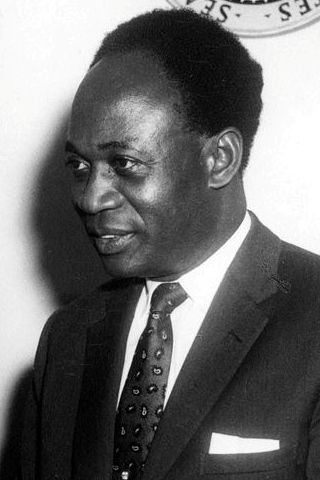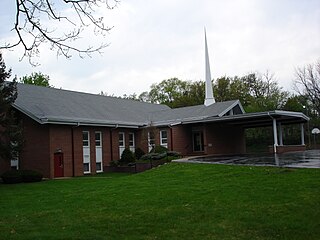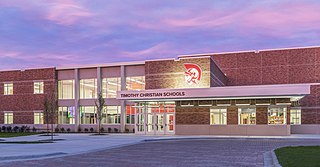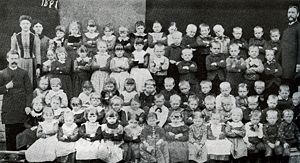
Francis Kwame Nkrumah was a Ghanaian politician, political theorist, and revolutionary. He was the first Prime Minister and President of Ghana, having led the Gold Coast to independence from Britain in 1957. An influential advocate of Pan-Africanism, Nkrumah was a founding member of the Organization of African Unity and winner of the Lenin Peace Prize from the Soviet Union in 1962.

Holland is a city in the western region of the Lower Peninsula of the U.S. state of Michigan. It is situated near the eastern shore of Lake Michigan on Lake Macatawa, which is fed by the Macatawa River. Holland is a thriving city with a diverse economy that includes manufacturing, agriculture, tourism, and higher education. It is home to a number of prominent companies, including Herman Miller, Haworth, and Johnson Controls. The city also attracts thousands of visitors each year for its annual Tulip Time Festival, which celebrates the area's Dutch heritage and vibrant tulip fields.
The Third Great Awakening refers to a historical period proposed by William G. McLoughlin that was marked by religious activism in American history and spans the late 1850s to the early 20th century. It influenced pietistic Protestant denominations and had a strong element of social activism. It gathered strength from the postmillennial belief that the Second Coming of Christ would occur after mankind had reformed the entire Earth. It was affiliated with the Social Gospel movement, which applied Christianity to social issues and gained its force from the awakening, as did the worldwide missionary movement. New groupings emerged, such as the Holiness movement and Nazarene and Pentecostal movements, and also Jehovah's Witnesses, Spiritualism, Theosophy, Thelema, and Christian Science. The era saw the adoption of a number of moral causes, such as the abolition of slavery and prohibition.

The Reformed Church in America (RCA) is a mainline Reformed Protestant denomination in Canada and the United States. It has about 104,921 members. From its beginning in 1628 until 1819, it was the North American branch of the Dutch Reformed Church.

A Christian school is a school run on Christian principles or by a Christian organization.

Roseland is one of the 77 official community areas of Chicago, Illinois, located on the far south side of the city. It includes the neighborhoods of Fernwood, Princeton Park, Lilydale, the southern portion of West Chesterfield, Rosemoor, Sheldon Heights and West Roseland.

The Chicago Theological Seminary (CTS) is a Christian ecumenical American seminary located in Chicago, Illinois, and is one of several seminaries historically affiliated with the United Church of Christ. It is the oldest institution of higher education in Chicago, originally established in 1855 under the direction of the abolitionist Stephen Peet and the Congregational Church by charter of the Illinois legislature.

The Netherlands Reformed Congregations is a conservative Calvinist denomination with congregations in Canada, the United States and Bolivia. It is affiliated with the Reformed Congregations in the Netherlands.

TyndaleChristian School is an independent, non-denominational Christian, co-educational ,early learning, primary and secondary day school, located in Blacktown, a suburb in Western Sydney, New South Wales, Australia.

Timothy Christian Schools is a private, nondenominational Christian school in Elmhurst, Illinois, founded in 1911.
William Culbertson III was as an American pastor, bishop of the Reformed Episcopal Church, and the fifth president of the Moody Bible Institute, in Chicago, Illinois.

Raleigh Christian Academy (RCA) is a private, Christian, coeducational, primary and secondary day school located in Raleigh, North Carolina, United States. Also referred to as simply Raleigh Christian, the school seeks to educate students in a traditional Christian environment.
High Point Christian Academy (HPCA) is a private, college preparatory, Christian school located in High Point, North Carolina, United States serving students in preschool through twelfth grade. HPCA is a member of the Association of Christian Schools International (ACSI), Southern Baptist Association of Christian Schools (SBACS) and Triad Association of Non-Public Schools (TANP).

John Knox Christian School (JKCS) is an independent Christian school located in Oakville, Ontario, Canada. It was founded in 1953 and began classes in 1959. John Knox currently has an enrollment of about 350+ students. JKCS is a member of the Ontario Alliance of Christian Schools (OACS).

ThereforeGo Ministries is a Christian youth ministry for short-term mission trips in the United States and Canada that was formed in September 1919. The organization is a non-denominational ministry that has its roots in the Christian Reformed Church in North America, but partners with other Christian denominations. ThereforeGo is a member of the Evangelical Council for Financial Accountability (ECFA) and Standards of Excellence in Short-Term Mission (SOE). It is one of two youth ministries under the Dynamic Youth Ministries umbrella organization, with the Calvinist Cadet Corps.
Elim Christian Services, is a Christian ministry, based in the southwest suburbs of Chicago, Illinois, that serves individuals with disabilities. Elim's east campus and west campus are located in Crestwood, Illinois, and its South campus is located in Orland Park, Illinois. Elim's Christ-centered programs include a special education program, a vocational and day program for adults with disabilities, and a learning program that trains Elim staff and partners with other educational organizations or ministries serving individuals with disabilities nationally and internationally. The school was founded in 1948 by Dutch Reformed church members. Elim holds an annual Dutch festival and fundraiser.
The Salem School, Osu, or the Osu Presbyterian Boys’ Boarding School or simply, Osu Salem, formerly known as the Basel Mission Middle School, is an all boys’ residential middle or junior secondary school located in the suburb of Osu in Accra, Ghana. The Salem School was the first middle school and the first boarding school to be established in Ghana. The school was founded under the auspices of the Basel Mission in 1843 and supervised by three pioneering missionaries and schoolmasters, Jamaican, Alexander Worthy Clerk and Angolan-born Jamaican Catherine Mulgrave together with the German-trained Americo-Liberian George Peter Thompson.
Kwame Nkrumah University (KNU) is a public university in Zambia.

Roelof Harms Smit was a Dutch-American minister. Smit ministered a congregation in Drenthe, Michigan in the mid-1800s, which led to a notable secession in the history of the Christian Reformed Church of North America.


















